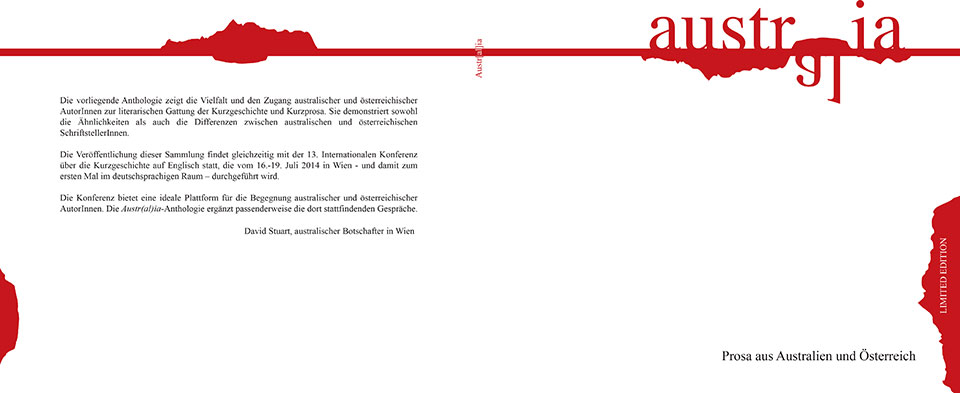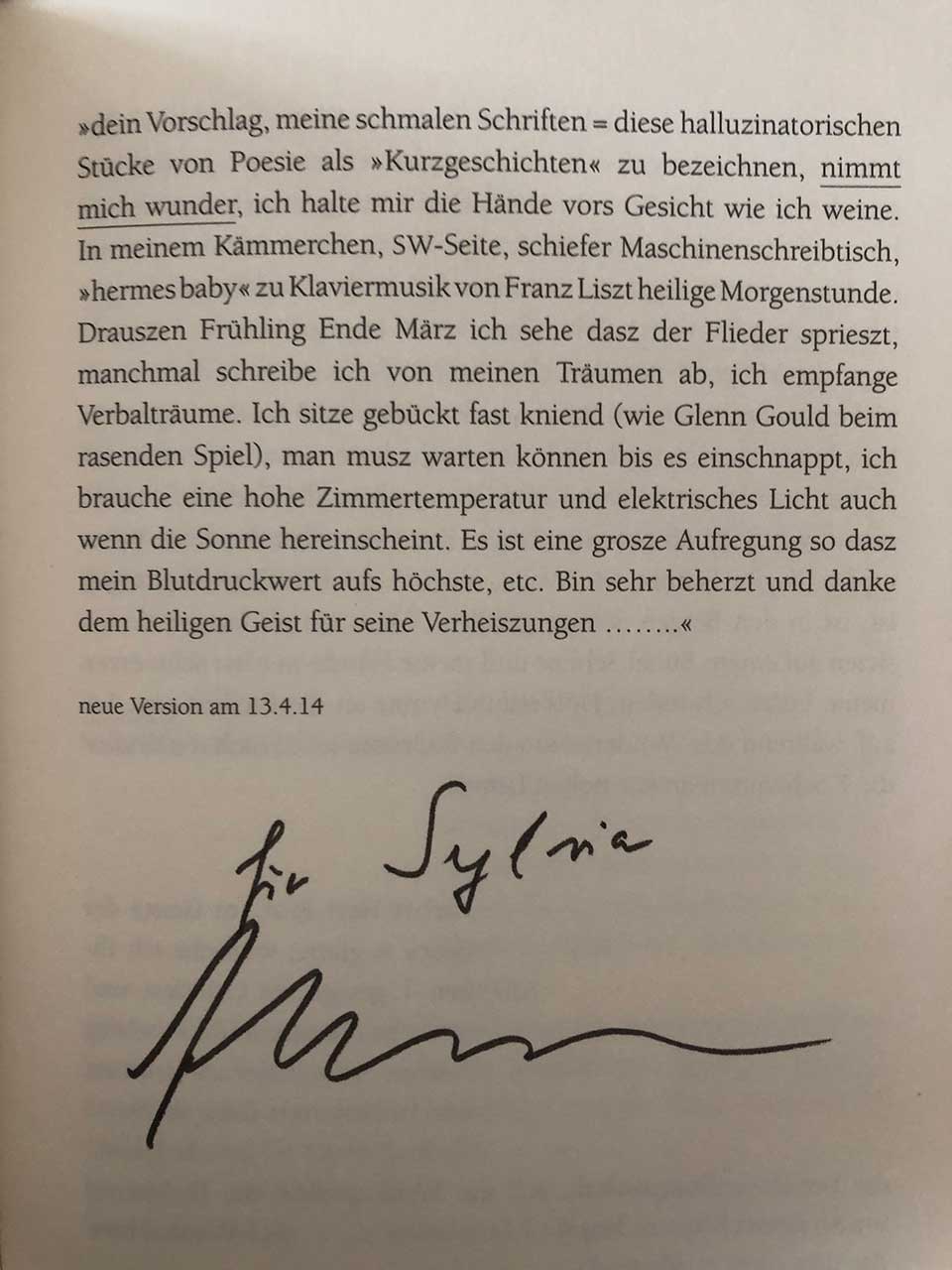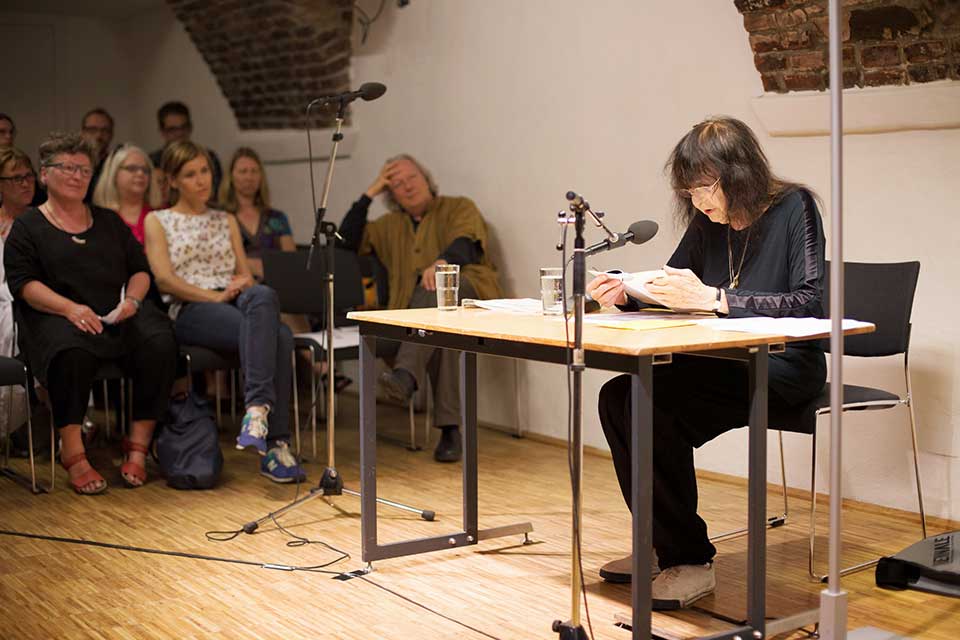Sylvia Petter recalls Austrian writer Friederike Mayröcker, who passed away June 4, not long after the book-themed TV series ÜBER featured her in its first episode.
Friederike Mayröcker passed away on June 4, 2021, in Vienna, aged ninety-six. She was farewelled to Louis Armstrong’s “What a Wonderful World” and was laid to rest on June 17 in a grave of honor at the Central Cemetery beside her partner of many years, the poet Ernst Jandl, who died in 2000. I was fortunate to meet Mayröcker, albeit in a roundabout way.
I was involved with editing an anthology of prose, poetry, and artwork called New Sun Rising: Stories for Japan to raise money for the Japanese Red Cross following the Fukushima earthquake in 2011. I had gone to the Literaturhaus to see Marion Steinfellner, a Viennese poet and Butoh dancer. When I mentioned the anthology, she immediately said that Mayröcker had written a poem mentioning Japanese cats that might fit the anthology, and that I needed to meet her confidante, Christel Fallenstein, who would be able to guide me.
Christel Fallenstein was very helpful; Mayröcker agreed to participate and donated the poem, but it had to be rendered in English. The translator Liselotte Pope-Hofmann, who had already translated some of Mayröcker’s work, agreed to translate the poem, the pertinent parts of which are:
. . . while the Japanese cats namely the cats are weeping actually waving: wailing you know nothing matters . . .
. . . as for the eye-slits of the cats which in the ZONE = forbidden zone are wandering about and weeping and crying . . .
We were finalizing the anthology, but I felt Mayröcker’s poem would make a good link between the introduction and the works themselves donated by artists and writers from all over the world.
In 2014 the 13th International Conference on the Short Story in English was held in Vienna. As Vienna co-director, I was responsible for ensuring that we also had good local representation. Again, I thought how great it would be to have Mayröcker read in a plenary session in German and have the English translation scroll behind her on a large screen.
“But I do not write short stories,” she said. “Ah, but the form is changing,” I said, “there are so many ways to tell a story. Just look at Empress Sissi, how her hair curls in tendrils escaping every which way. This, too, is story.” We already had discussed the first flash fictions two years earlier at the 12th International Conference in North Little Rock.
Liselotte Pope-Hofmann agreed once more to translate Mayröcker, this time for the Vienna conference, which welcomed short-story writers from around the world. One of these was the Australian short-story writer and poet Andy Kissane, who immediately hit it off with Mayröcker and gave her one of his own poetry books and just sent me these words: “I met Friederike Mayröcker at the International Conference on the Short Story in English in Vienna in 2014. We read at an Austrian/Australian event together at Alte Schmiede and I caught up with her afterwards at the conference. My father was about her age at the time, and was running a choir in the aged care home where he lived, and we talked about that and how she was writing every day. She was warm, welcoming, and so full of energy for poetry and for life.”
Two poets, attending a short-story conference, helped everyone appreciate the changing short-story genre. Just the year before, American writer Lydia Davis had won the Man Booker for her very short fiction, setting the stage for an explosion of the short form in what is today practiced as flash fiction.
On one wonderful evening, Austrian and Australian writers attending the conference read from their works in their own language in the Alte Schmiede. We issued a limited edition of stories by Austrian and Australian writers in German with an introduction by the Australian ambassador. Sales of the anthology went toward financing the participation of one of the Austrian writers, Judith Nika Pfeifer, at the next Short Story Conference in Shanghai two years later.

After the conference, I met up several times with Mayröcker, by chance and at readings, the latter from her 2016 book Fleurs, which contained a poem revised on April 13, 2014, which, to my great delight and honor, she signed for me. I recognized our discussion and how I tried to convince her to attend a “short-story conference.”
your suggestion, my slim writings = these hallucinatory pieces of poetry ought
to be called “short stories”, makes me marvel,
I am holding my hands in front of my face how
I am crying. In my little room,
facing s/w, lop-sided typewriting desk “hermes
baby” with piano music by
Franz sacred morning hour. Outside
spring end of March I can see
that the lilac is thriving, at times
I copy from my dreams,
I receive verbaldreams. I sit bent over
almost kneeling (like Glenn Gould
playing like possessed), one needs to be able
to wait until it clicks, I
need a high room temperature and
electric light even when the
sun is shining in. It is a great
excitement so that my
blood pressure level in the highest, etc. Am
full of courage and thank the Holy
Ghost for his promises . . .
new version, April 13, 2014, © by FM
Translation by Liselotte Pope-Hoffmann
When Fleurs was published by Suhrkamp in 2016, I was thrilled to find the original of the above and of course asked to have the page signed.

It was no surprise to see a visit to Mayröcker—always one to be interested in what younger writers were up to—kick off the new book TV series ÜBER, created by Judith Nika Pfeifer and Daniela Emminger in 2020. Their aim is to make books and reading “cool” again and every couple of months to introduce an author and related works. At 07:57 in the first episode of ÜBER, you can see them visit Mayröcker just before her ninety-sixth birthday last year.
She will be missed by young and old, but her words will live on. I am so proud and moved to have been able to meet her.
Vienna
